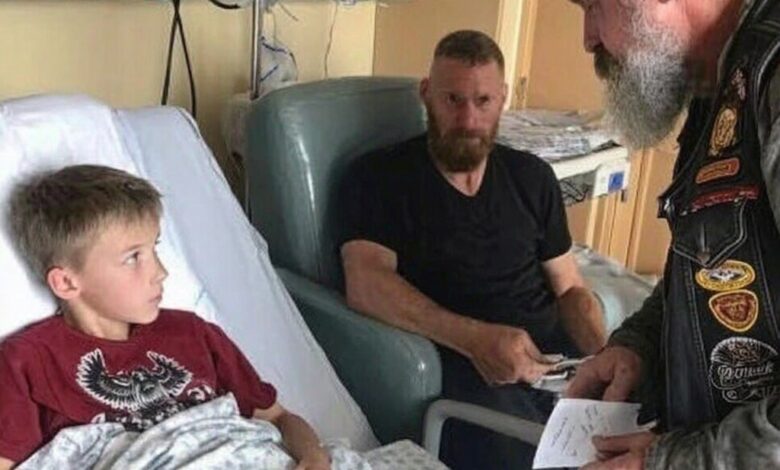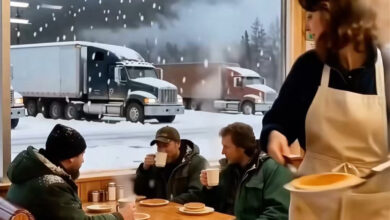
Biker Threw Cash at My Paralyzed Son in The Hospital and Said Keep the Change
Biker threw cash at my paralyzed son in the hospital and said, “Keep the change.” Then he walked out before either of us could process what had just happened.
My name is Michael Torres, and that moment in Room 437 of St. Catherine’s Medical Center changed everything I thought I understood about my family, my past, and the man I’d spent seventeen years pretending didn’t exist.
The biker was maybe sixty-five years old, with a gray beard that reached his chest and hands scarred from decades of mechanical work. He wore a leather cut covered in patches I didn’t recognize and moved with the careful deliberation of someone who’d thought about this moment for a very long time — but still wasn’t sure he’d made the right choice.
He walked into my son’s hospital room at 2 PM on a Thursday afternoon in October. I was sitting in the same vinyl chair I’d occupied for most of the past three months, ever since the car accident that had severed Jacob’s spinal cord at T6 and paralyzed him from the chest down.
Jacob was seventeen — a senior in high school, an honors student who’d planned to study engineering at the state university. Now he was learning to operate a wheelchair, coming to terms with a body that no longer obeyed his commands.
The biker didn’t knock. He just appeared in the doorway like he’d materialized from somewhere outside normal reality. He stood there for maybe ten seconds, looking at Jacob with an expression I couldn’t read — not pity exactly, but something deeper. Something that looked like recognition mixed with grief.
“You’re Jacob Torres,” the biker said.
It wasn’t a question.
My son looked at him, confused.
“Yeah? Do I know you?”
The biker reached into his cut and pulled out a manila envelope, worn and creased from years of handling. He walked to Jacob’s bedside — I was already standing, already moving between this stranger and my vulnerable son — and dropped the envelope on the blanket covering Jacob’s useless legs.
“That’s yours,” the biker said. “Been saving it since you were two years old. Figured you’d need it for college. Circumstances changed, I guess, but money’s money. Use it however you need to.”
Jacob opened the envelope with shaking hands. Inside was a bank statement showing an account in his name with a balance of $47,000. Attached was a deposit receipt dated fifteen years earlier — an initial deposit of $5,000. Below that were monthly deposits, every single month for fifteen years, ranging from $200 to $500.
“I don’t understand,” Jacob said, his voice cracking like it had been since the accident — since the days when he’d cry without warning, when the weight of his new reality became too much.
“Who are you? Why would you do this?”
The biker looked at me then — really looked at me — for the first time since entering the room. Something flickered across his weathered face. Disappointment, maybe. Or something closer to disgust.
“Ask your father,” he said quietly. “He knows who I am. He’s known for seventeen years. He just chose to pretend he didn’t.”
Then he turned and walked out.
I stood frozen for maybe five seconds before my brain started working again. By the time I reached the hallway, the biker was already at the elevator, already stepping inside. I called out — I don’t even remember what I said — but he didn’t turn around. The doors closed, and he was gone.
I stood there in that harsh fluorescent light, my heart hammering, my son calling my name from the room behind me.
When I walked back in, Jacob was staring at the bank statement like it might reveal some hidden truth if he just looked long enough.
“Dad,” he said slowly, “what the hell was that? Who was that guy? Why does he have an account in my name?”
I sat down heavily in the chair. Seventeen years of silence — seventeen years of pretending — began to collapse.
“His name is Ray Castellanos,” I said finally.
“He’s… he was your—”




